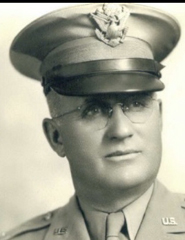Miles Visits Home of Nazi Bigwig
By Frank Miles
(Iowa Daily Press War Correspondent)
Grunwald, Germany (IDPA) -- Prof. Don Tornquist of Wartburg college, was living in a beautiful chateau with a private swimming pool on a picturesque site in this Munich suburb when I met him.
He arrived in Germany in February after a 20-month visit in Persia. Whether he would soon start a tour of the Western Pacific he didn't know. The Hawkeye educator has for 3 years been on leave to serve Uncle Sam. He is a technical sergeant in the 81st ordnance battalion of the 54th group of the 7th army. In that job he shares his home with many other soldiers. The chateau was being used as a headquarters for his outfit. He and another GI were figuring points for possible discharge for comrades when we were introduced.
"It doesn't look as if any of our men qualifies under the regulations to leave the army now, though most of us have been overseas twice as long as many, who will," he smiled. "We didn't have any combat out in Persia but we had intense heat and difficult living conditions for Americans."
Tornquist said that while he regretted it, he felt that universal compulsory military training in the United States would be necessary for long after Japan is defeated.
"I do hope that a plan may be worked out so that a young man's time spent in the army will not be wholly lost to his civilian career," he added.
The sergeant frankly admitted he had changed his mind about how to keep American out of war since entering the service.
"I was one of those who thought that the way for us to keep the peace was to be virtually with the wherewithal to fight and to be very peaceful i out attitude toward all other countries regardless of what they might be doing," he explained. "I think differently after seeing what I have seen in Germany."
We discussed the nazi mind.
"When we were in one house, " he related, "the wife of the owner returned and found that a little piece of the corner of a clock had been broken off.
"You cannot treat us Germans like you would Frenchmen or Poles - we are cultured," she told him.
Tornquist was born in Mitchellville. Mrs. Tornquist is a teacher at Davenport. He said that 2 medics of his battalion were Iowans -- T/5 Alfred Moeller, Sioux City, and Cpl. Herman Anderson, Des Moines.
Tornquist was in a spacious room, which had been used by its former occupant Reichsfachayzmeiffer Franz Xavier Schwarz, pay master general of Adolf Hitler's armed forces. Herr Schwarz was No. 6 in the nazi party and No 2 in Heinrich Himmler's gestapo organization. He fled 2 months before the Americans arrived.
The house was typical of those owned by the high ranking Hitlerites. There was every modern convenience with lavish furnishings, hundreds of nazi books and pictures. Huge paintings of nude women that stretched artistry into vulgarity reflected the tastes of Schwarz and his friends.
Two sergeants had cots in a room occupied by Schwarz' bodyguard. Capt. Ludwig Seus, whose clothes, guns and a collection of obscene literature, photographs and cartoons, were still in the room. Pictures of that once powerful and fearful character showed him to be cocky and cold.
Schwarz was one of the organizers of the famous Munich beer hall putsh that landed Hitler and his neighbor, Rudolph Hess, in jail. He managed to escape imprisonment himself. Residences of Hess and Dr. Robert Ley were nearby.
The battalion headquarters were moving into another house the next day because they had been outranked for the one they occupied by a major general.
Earlier that day I was at the headquarters of a service company, which was in what was once a huge nazi army tailoring plant. A husky, middle-aged German civilian suddenly started to walk briskly through the gate. A captain and corporal halted him and asked for his pass. He didn't have one and the conversation with a GI who understood the German refused to say why he wanted to enter. Told to leave, he jumped up and down waving his arms and swearing.
No, the Americans didn't manhandle him. They seized him gently but firmly by his elbows and escorted him to the sidewalk.
Source: Mason City Globe-Gazette, June 15, 1945
![]()

